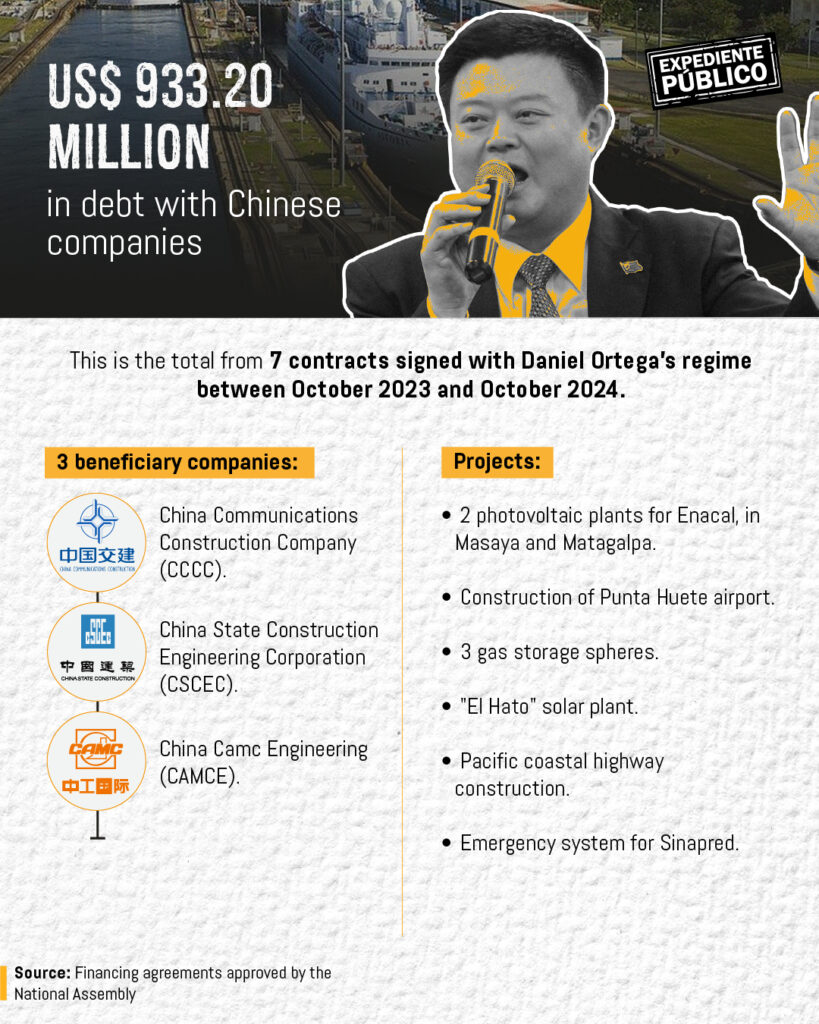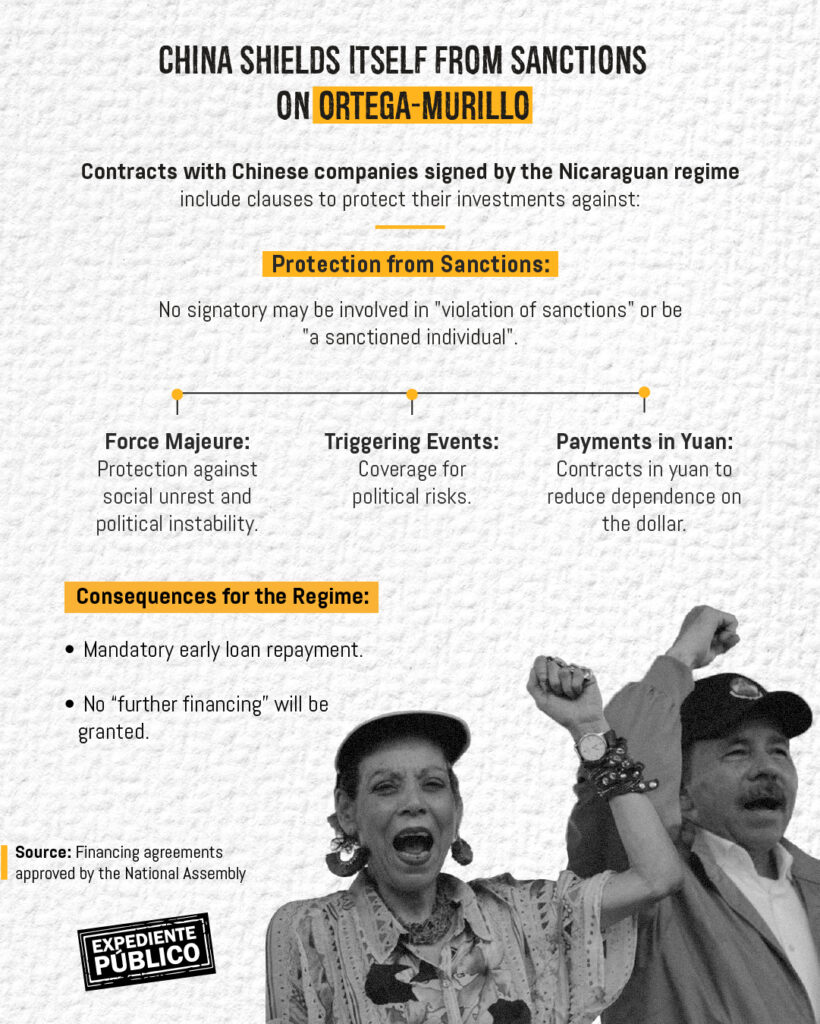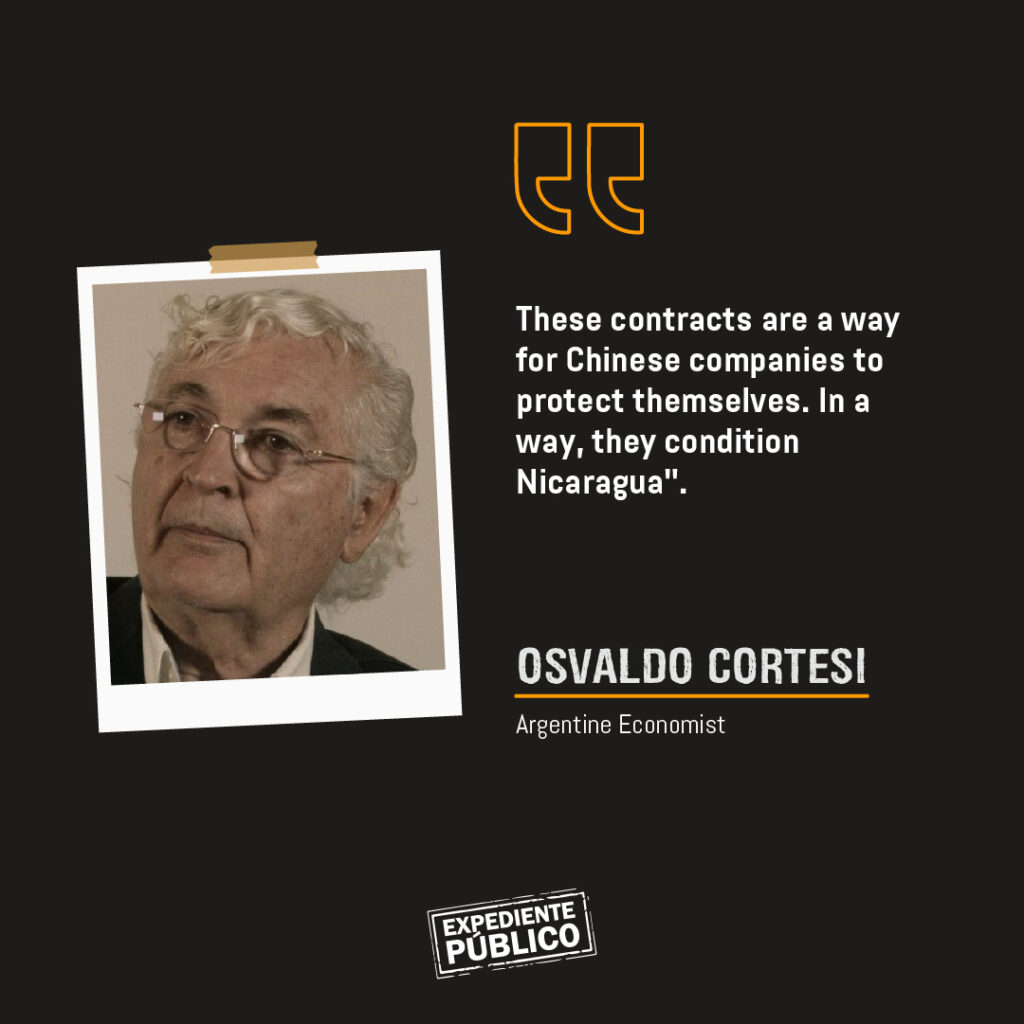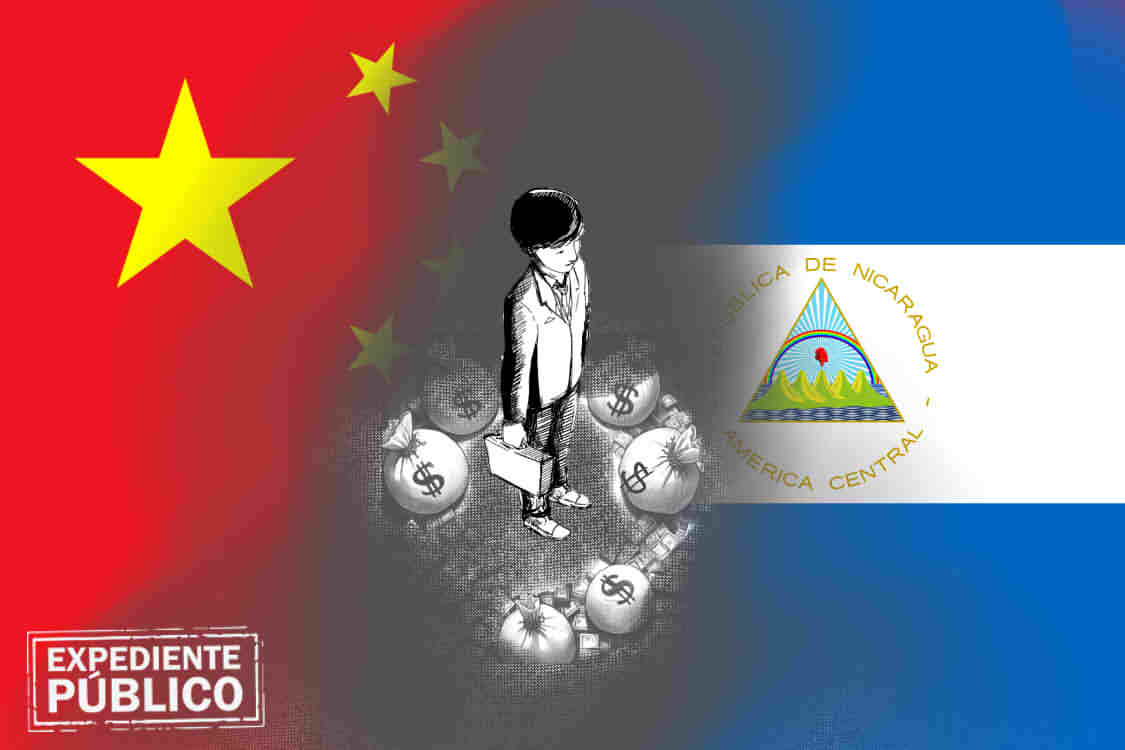* China’s “credit facility agreements” not only promote its companies but also include clauses that protect Beijing’s interests against political risks and potential sanctions targeting the regime.
** Neither the debtor nor the owner of any Chinese project in Nicaragua must be in “violation of sanctions”.
*** Two Chinese companies received multimillion-dollar disbursements, as recorded in the budget reform.
Expediente Público
Contracts with Chinese companies bring new financing conditions adapted to the political risks in Nicaragua and the international sanctions faced by the regime of Daniel Ortega and Rosario Murillo.
These “Credit Facility Agreements” include special clauses to protect Chinese companies from international sanctions, social conflicts, and political instability in Nicaragua.
This type of clause included in the agreements has not been applied in other countries, explained Hernán Alberro, a member of the China In The World Network, to Expediente Público.
Although China’s opacity is significant and “not many of these contracts have been obtained or made public,” the expert notes that in countries that do not typically face sanction issues, such as Argentina or Chile, such clauses do not exist.
“For example, in Ecuador, many of these agreements (memorandums of understanding) were seen, and I do not recall a clause of this nature that shields against possible sanctions,” said Alberro.
Subscribe to the Expediente Público newsletter for more information.
3 Chinese Companies, 7 Contracts
Between October 2023 and October 2024, Nicaragua signed seven contracts with three companies from the People’s Republic of China: China Communications Construction Company (CCCC), China Camc Engineering (CAMCE), and China State Construction Engineering Corporation (CSCEC).
The seven agreements signed by the regime total USD 933.2 million.
These companies are state-owned, listed on major Chinese stock exchanges, and operate under the State-owned Assets Supervision and Administration Commission (SASAC) of China’s State Council.

Beyond the Belt and Road: Impact of Chinese Companies in Central America, a study by the think tank Expediente Abierto, reveals that companies linked to the Chinese Communist Party (CCP) play a substantial role in China’s global expansion ambitions, framed within initiatives like the Belt and Road.
However, in Nicaragua, since 2018, international sanctions have targeted at least 110 regime officials and 16 institutions for gross human rights violations committed by the Ortega-Murillo regime.
In its effort to evade international sanctions, the regime approved the “Law for the Protection of Nicaraguans Against Sanctions and External Aggressions” through the National Assembly in November 2024.
Sanctions and Triggering Events
Facing this situation, Xi Jinping’s regime takes no chances in Nicaragua. The first contract signed between Nicaragua and a Chinese company on October 31, 2023, already included protection clauses against “triggering events” and “political risks.”
You may also read: The Poor Record of Chinese Companies Promising Investments in Nicaragua
Since April 2018, Nicaragua has faced a socio-political crisis. The Ortega-Murillo regime’s repression resulted in 355 deaths and more than 2,000 injuries.
Additionally, human rights organizations estimate that at least 800,000 Nicaraguans have fled due to political, economic, or forced exile reasons.
Another agreement with CCCC for the design and construction of a photovoltaic plant in Matagalpa, owned by the state-run Empresa Nacional de Acueductos y Alcantarillados (Enacal), also protects China’s interests against political risks that might affect the contract’s execution. It obligates the Ortega-Murillo regime to provide indemnification if necessary.
China’s Risk Assessment
From China’s perspective, potential risks include restrictions on paying any debt capital or interest and the issuance of a “default order” against the regime.
The CCCC company safeguards itself against “force majeure” events, including “wars, civil wars, revolts, revolutions, riots, or terrorist attacks” in Nicaragua that could hinder contractual obligations.
According to Article 5 of CCCC’s contract, in case of a triggering event, an “obligatory early payment” clause is activated.
“The creditor may, at their absolute discretion, (…) declare all outstanding amounts of capital, commissions, and accrued interest immediately due and payable,” states the document.
Additionally: Nicaragua’s Regime Amplifies Propaganda About the Interoceanic Canal with China
In this case, Enacal would have only ten days to pay the Chinese company CCCC.
Both the regime and the Chinese company make it clear that at the time of contract signing, neither Enacal nor the debtor, the Ministry of Finance and Public Credit, is “under sanctions.”
The Operating Model of Chinese Companies
According to Argentine economist Osvaldo Cortesi, every Chinese financing mechanism includes “some secret clauses and others that are not.”
“It’s a way of protecting themselves and also conditioning other assistance (…). In some way, they condition the country. Sometimes it’s cross-sanctions, meaning if a Chinese company isn’t paid, other Chinese projects in other activities collapse,” Cortesi told Expediente Público.
Cortesi added that this “relates to China’s logic of lending to countries with vulnerabilities that suddenly face internal (and) political issues”.

“Beyond normal international loan clauses from institutions like the Inter-American Development Bank or World Bank, China has obviously special preferences. Whether these are new, I don’t know,” Cortesi mentioned.
Which Sanctions Do the Contracts Address?
The contracts specify sanctions imposed by the UN Security Council, the U.S. Treasury Department, or any other authority.
Additionally, restrictive measures from the European Union and the United Kingdom are included.
According to the contract, the financing agreement acquired by Enacal with this company is for €65.9 million (USD 60.4 million), corresponding to 80% of the project’s total cost.
Also: Chinese Company Accused of Bribery Will Build a Dam in Honduras
Enacal provided the remaining 20% to the Chinese company CCCC as an “advance payment.”
Another contract benefiting this company for the design, supply, and construction of the solar photovoltaic power generation plant “El Hato,” in Matagalpa, also includes measures to protect against potential sanctions.
The company guarantees that neither the debtor nor the project owner has been or is involved in a “violation of sanctions” or is “a sanctioned person.”
Camce Also Protects Itself
China CAMC Engineering (Camce) secured at least three contracts with the regime, amounting to 3.31 billion yuan, equivalent to USD 468.1 million.
The company, accused in other Latin American countries of corruption, as highlighted in the Expediente Público investigation, “The Poor Record of Chinese Companies Promising Investments in Nicaragua,” also includes clauses addressing sanctions.

Article 6 of the agreement signed by the Ministry of Finance for Nicaragua’s National Emergency Response System project with Camce establishes the consequences if the “project owner or its authorized signatories are affected by sanctions.”
The obligation of the National System for Disaster Prevention, Mitigation, and Attention (Sinapred), as the project owner, is to inform Camce within seven business days following the sanctions event.
Then, Camce will not make “further financing available; it will be immediately canceled,” according to the contract.
Additionally, the Chinese company may “declare the contract resolved” and require that all pending amounts, including interest and other charges, immediately become “due and payable.”
Economist Juan Sebastián Chamorro, a former political prisoner and Nicaraguan exile, believes that by “protecting themselves from all possible risks,” Chinese companies show they “understand that sanctions are a possible event.”
“For me, it reflects another clause I find highly abusive, which forces them to pay 20% of the project upfront,” Chamorro noted.
Budget Amendment
On December 17, 2024, Nicaragua’s Assembly approved an amendment to the 2024 General Budget, including payments to Camce and CCCC to commence the works outlined in the agreements.
The amendment includes the allocation of 3.70 billion córdobas (USD 101.21 million) from Treasury revenues to the Ministry of Transport and Infrastructure for the reconstruction, expansion, and improvement of Punta Huete Airport.
The regime also allocated 311.5 million córdobas (USD 8.5 million) for the project named Nicaragua’s National Emergency Response System, also executed by Camce.
As part of the external public debt service, it adds 82.4 million córdobas (USD 2.25 million) for commission payments to Camce.
The company CCCC also received a budget allocation.
For this company, 414.4 million córdobas (USD 11.3 million) were allocated for constructing a photovoltaic water treatment plant for Enacal systems in San Isidro, Matagalpa.
Additionally, 560.3 million córdobas (USD 15.3 million) were allocated for a photovoltaic plant in Masaya, intended to serve Enacal’s operations.
Replacing the Dollar with the Yuan?
Beijing has implemented a financing strategy in several Latin American countries, such as Bolivia, Argentina, and Ecuador, involving operating debt directly in yuan instead of dollars.
This practice, also observed in Nicaragua, reflects China’s interest in internationalizing its currency and reducing dollar dependence in international transactions.
While not seeking to replace the dollar as a global currency, they aim for the yuan to “begin playing a stronger role in international trade,” Alberro explained.
Additionally, according to Alberro, with this type of agreement, “what they do is start operating debt in their own currency. Often, these are debt swaps, converting short-term debt into longer-term debt.”





